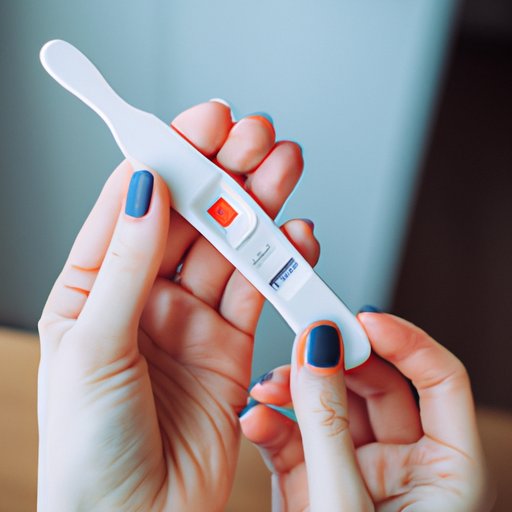Introduction
When trying to conceive, many women are eager to know whether or not they are pregnant as soon as possible. But how soon can you detect pregnancy? In this article, we’ll discuss the definition of pregnancy, the early signs and symptoms, and how to detect pregnancy in the first few weeks.
According to the American College of Obstetricians and Gynecologists (ACOG), pregnancy is defined as “the state of carrying a developing embryo or fetus within the female body.” It begins with fertilization of the egg by the sperm and ends with birth. A full-term pregnancy usually lasts 40 weeks, but can range between 37 and 42 weeks.
How to Detect Pregnancy in the First Few Weeks
In the first few weeks after conception, you may experience a variety of physical and emotional changes. These changes can occur even before the first missed menstrual period and can include:
- Tenderness of the breasts
- Increased fatigue
- Nausea and vomiting
- Frequent urination
- Light spotting or cramping
- Food cravings or aversions
- Mood swings
These signs and symptoms can be difficult to distinguish from premenstrual syndrome (PMS) and it can be hard to know for sure if you are pregnant. The only way to confirm a pregnancy is by taking a home pregnancy test.
When is the Best Time to Take a Pregnancy Test?
Home pregnancy tests measure the levels of human chorionic gonadotropin (hCG) in your urine. This hormone is produced during pregnancy and is present in the urine of pregnant women. It is important to note that hCG levels can vary greatly from one woman to another, so it is important to consider a few factors when deciding when to take a pregnancy test.
The most accurate results will be found if you wait until at least one week after your expected period date. However, some tests can detect hCG levels as early as four days before your period is due. Additionally, if you have irregular periods, it can be difficult to know when to take the test since it is based on your expected period date.
It is also important to note that the accuracy of the test can depend on the brand you use and how long you wait to take it. According to a study published in the journal Obstetrics & Gynecology, the most accurate results were found when the tests were taken seven days after the expected period date.
How Long After Conception Can You Tell if You’re Pregnant?
Once conception occurs, it takes about a week for the fertilized egg to travel to the uterus and attach itself to the uterine wall. At this point, the embryo starts producing hCG hormones, which can be detected in the blood and urine.
hCG levels typically double every two to three days in early pregnancy. This means that once the egg implants in the uterus, it could take anywhere from 7 to 12 days for hCG levels to be high enough to be detected on a home pregnancy test. So while it is possible to get a positive result as soon as seven days after conception, it’s more likely to take longer.
In addition to detecting hCG levels, there are other common symptoms of early pregnancy that can help you determine if you are pregnant. These include nausea, fatigue, frequent urination, food cravings or aversions, and tenderness of the breasts.
Conclusion
In conclusion, it is possible to detect pregnancy in the first few weeks after conception. Physical and emotional changes are common in early pregnancy, and a home pregnancy test can detect hCG levels in the urine. However, it is important to note that hCG levels can vary greatly from one woman to another, so it is best to wait at least one week after your expected period date for the most accurate results.
If you think you might be pregnant, it is important to talk to your healthcare provider as soon as possible. They can help you understand the different stages of pregnancy and provide you with resources to help you make informed decisions.
Resources for Further Information
American College of Obstetricians and Gynecologists: FAQs About Pregnancy
Mayo Clinic: Home Pregnancy Tests: When to Take One
Obstetrics & Gynecology:
(Note: Is this article not meeting your expectations? Do you have knowledge or insights to share? Unlock new opportunities and expand your reach by joining our authors team. Click Registration to join us and share your expertise with our readers.)
